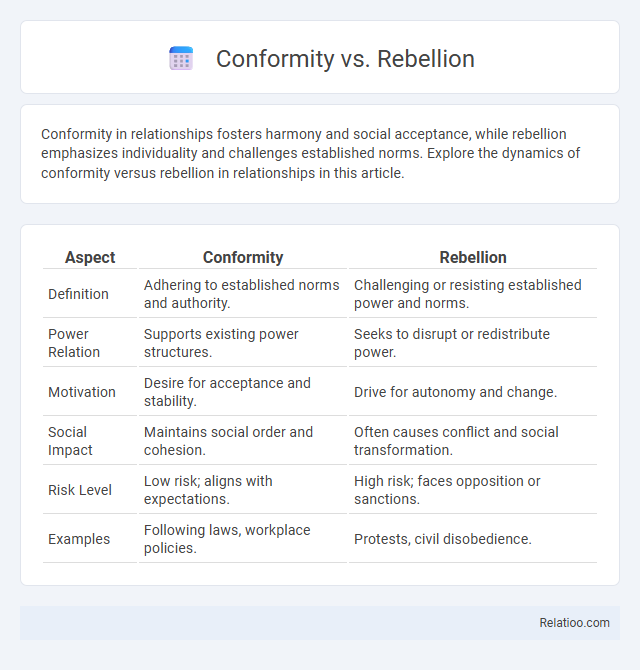Conformity in relationships fosters harmony and social acceptance, while rebellion emphasizes individuality and challenges established norms. Explore the dynamics of conformity versus rebellion in relationships in this article.
Table of Comparison
| Aspect | Conformity | Rebellion |
|---|---|---|
| Definition | Adhering to established norms and authority. | Challenging or resisting established power and norms. |
| Power Relation | Supports existing power structures. | Seeks to disrupt or redistribute power. |
| Motivation | Desire for acceptance and stability. | Drive for autonomy and change. |
| Social Impact | Maintains social order and cohesion. | Often causes conflict and social transformation. |
| Risk Level | Low risk; aligns with expectations. | High risk; faces opposition or sanctions. |
| Examples | Following laws, workplace policies. | Protests, civil disobedience. |
Defining Conformity and Rebellion
Conformity involves aligning behaviors and beliefs with established societal norms to gain acceptance and avoid conflict, often driven by social pressures and the desire for belonging. Rebellion represents a conscious refusal to adhere to these norms, challenging existing structures and provoking change through nonconformity or resistance. Understanding the dynamic between conformity and rebellion reveals how social order is maintained or disrupted within a community.
Historical Perspectives on Social Compliance
Historical perspectives on social compliance reveal that conformity has often been reinforced through institutional power and cultural traditions to maintain social order, while rebellion served as a catalyst for change by challenging oppressive norms. Societal norms historically emerge from collective values codified in laws, religious doctrines, and customs, creating frameworks that individuals either internalize or resist. Empirical studies of events like the French Revolution and the Civil Rights Movement illustrate how cycles of compliance and rebellion shape the evolution of social structures and cultural paradigms.
Psychological Foundations of Conformity
The psychological foundations of conformity are rooted in social influence mechanisms such as normative and informational influence, where individuals align their attitudes and behaviors to fit group expectations and avoid social rejection. Classic experiments by Solomon Asch demonstrated how peer pressure can lead to conformity even when individuals privately disagree, highlighting cognitive processes like group polarization and social comparison. Understanding conformity involves analyzing the interplay between individual identity, social norms, and the intrinsic human desire for acceptance within societal structures.
The Roots and Drivers of Rebellion
Rebellion often stems from deep-rooted dissatisfaction with societal norms that restrict individual freedom and expression, fueled by perceived injustice, inequality, or lack of autonomy. Psychological drivers such as identity formation, desire for self-empowerment, and resistance to authoritarian control intensify the urge to challenge conformity. Social factors including cultural shifts, peer influence, and historical context play critical roles in igniting collective and individual acts of rebellion against established conventions.
Benefits of Social Conformity
Social conformity promotes group cohesion by encouraging individuals to align their behaviors with shared societal norms, leading to increased social harmony and cooperation. Adhering to established norms reduces conflicts and social friction, making communities more stable and predictable. This collective adherence enhances trust and facilitates smoother communication, which contributes to efficient functioning within social, organizational, and cultural systems.
The Power and Consequences of Rebellion
Rebellion challenges societal norms, often disrupting established power structures and prompting critical social change. The power of rebellion lies in its ability to expose injustices and inspire collective action, but consequences include potential alienation, legal repercussions, and social instability. Understanding the balance between conformity and rebellion is essential for navigating the complexities of social order and progress.
Famous Examples in Culture and History
Iconic figures like Martin Luther King Jr. and Rosa Parks symbolize rebellion against societal norms, challenging conformity through civil rights activism that reshaped cultural values. In contrast, characters such as Jay Gatsby reflect conformity's allure and pitfalls within rigid social hierarchies, highlighting the tension between personal desires and communal expectations. Your understanding deepens by analyzing these paradigms evident in historical movements and literary narratives, revealing how conformity and rebellion shape societal evolution.
Conformity and Rebellion in Modern Society
Conformity in modern society often manifests through adherence to established social norms, such as dress codes, workplace behaviors, and digital etiquette, reinforcing group cohesion and predictability. Rebellion challenges these norms by promoting individual expression, innovation, and social change, frequently seen in movements advocating for civil rights, environmental activism, and alternative lifestyles. The dynamic tension between conformity and rebellion shapes cultural evolution, influencing societal stability and progress.
The Balance Between Individuality and Social Norms
Navigating the balance between individuality and societal norms requires understanding how conformity shapes group cohesion while rebellion drives social change. Your unique identity can coexist with collective expectations by selectively adopting behaviors that align with your values and challenge restrictive conventions. This dynamic interplay ensures personal freedom flourishes without dismantling the social fabric essential for community stability.
Navigating Conformity and Rebellion in Everyday Life
Navigating conformity and rebellion in everyday life requires balancing societal norms with your personal values to maintain social harmony while asserting individuality. Understanding the benefits of conformity, such as social acceptance and stability, alongside the positive impact of rebellion in fostering change and innovation, helps you make informed decisions about when to adhere or challenge social expectations. Mastering this dynamic enables you to effectively engage with community standards without compromising your identity.

Infographic: Conformity vs Rebellion
 relatioo.com
relatioo.com